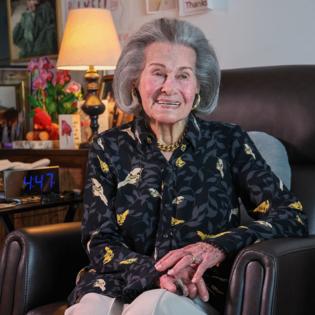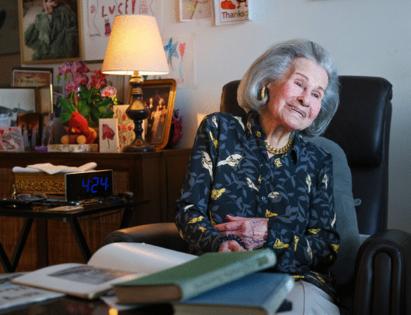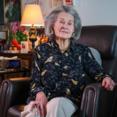As Holocaust survivors continue to vanish, one of the oldest in Miami shares her story
Published in News & Features
MIAMI -- Lucy Lowell, who survived the deadliest Nazi concentration camp to build a full life in New York City and eventually settle in Miami Beach, is among the last of an important and increasingly rare group of people.
At 103, she’s among the oldest living Holocaust survivors in the world.
It’s a population that’s disappearing with each passing year. Just 1,400 survivors are estimated to be alive today over the age of 100, according to a new report. It means that the opportunity to hear firsthand stories of endurance in the face of monstrous evil is quickly passing by.
Within the next six years, half of all Holocaust survivors will pass away. And 70 percent will pass away with in 10 years, according to a population projection report from the Conference on Jewish Material Claims Against Germany, also referred to as the Claims Conference.
The findings are “a stark reminder that our time is almost up,” said Gideon Taylor, president of the Claims Conference. “Our survivors are leaving us and this is the moment to hear their voices,” he said.
And Lowell isn’t even the oldest in Florida. Another Florida survivor, Lithuanian-born Malka Schmulovitz, was recently honored by the city of Miami Beach on her 109th birthday. Schmulovitz was not available for an interview but told the Claims Conference that their experiences must never be forgotten.
“To be one of the oldest survivors alive right now at my age tells me we are running our of time,” Schmulovitz told the Claims Conference. “We all have a testimony that needs to be shared.”
Lowell, for her part, admits trying to put the past behind her as she built a new life in the United States. After decades of staying silent about her experience escaping Auschwitz and surviving the Holocaust — she once turned down interviews with Steven Spielberg’s team for his Oscar-winning movie “Schindler’s List” — she has recently decided to share her story.
“At the time, with my husband, we did not talk about it. We wanted a new life, to enjoy each other and [not to] dwell on it,” she said.
That change of heart is due, in part, to a recent gift from researchers: long-lost books from Lowell’s childhood, including a book of biblical pictures she received as an award for good behavior at her religious school in 1930, when she was just eight-years-old.
“I was shocked,” Lowell said, pausing to reflect. “I was shocked.”
A small and stylish woman with a warm smile, Lowell recently sat in her Miami Beach apartment on Collins Avenue to reflect on those relics, which sparked a flood of painful memories.
She thumbed through a book of Jewish philosophy that was given to her older brother Gerhard on the day of his bar mitzvah. Gerhard was later killed in Auschwitz.
“I remember very well — the beautiful party, family… friends. I even remember the dress I wore,” she said, adding that she was just 10 years old at the time.
The family books were found in a private collection of 10,000 stolen Jewish books owned by Julius Streicher, a publisher of an antisemitic Nazi newspaper, according to The Sunday Times, and were returned due to the efforts of a project by JewishGen, a resource for Jewish genealogy at the Museum of Jewish Heritage in New York and the Leo Black Institute.
Now, over 80 years after the liberation of Auschwitz, Lowell looks back on a life that was split into two parts — the before and after. She recalled, in an interview with the Miami Herald, the events that changed the course of her life.
“I’ve always had a good memory. What can I say? I am blessed that I don’t have alzheimer’s or any of those illnesses,” she said. “It’s still there.”
Remembering the ‘before’
Before the Holocaust, Lowell lived a happy life with her parents and older brother in Berlin. She recalls “wonderful” childhood memories — vacationing in the summers with her family and attending the now-famous Olympic Games of 1936, where Jesse Owens made history.
She loved sports, dancing, and admiring the beautiful things in life — her mother’s stylish wardrobe, for example, which sparked an lifelong interest in fashion design.
Then on Nov. 9, 1938, with one violent night, the life Lowell knew and loved began to crumble.
Nazis set fire to synagogues — including the one attended by Lowell and her family — and vandalized thousands of Jewish homes and businesses, igniting a wave of violence that killed nearly 100 Jews and led to the arrests and deportations of thousands more. The night later became known as Kristallnacht, or “Night of Broken Glass,” signaling a turning point in Nazi Germany’s persecution against Jewish people, moving from social discrimination and propaganda to violence and terror.
The next several years would mark one of the darkest times in human history, both for Lowell and millions of other Jewish people around the world. All in all, six million European Jews and people from other minorities were killed by the Nazis during the Holocaust.
As conditions worsened for Jews — Lowell’s parents made arrangements to live with relatives in New York. But, due to travel restrictions, her family never made it to America.
“The consulates had closed, and we did not make it,” she said. “The whole living room was packed with boxes and crates and suitcases to ship to America. And we got stuck.”
Soon after, Lowell’s family received a visit one night from Nazi officers, who deported the Emmerich’s to the Lodz ghetto in Poland.
“We had just finished supper,” she said. She heard “a knock on the door, and two Gestapo officers came. They said, ‘We have to evict you, to deport you to Poland. So pack what you can carry, because there are no bell boys.”
In Lodz, Lowell’s family lived in “primitive” conditions among dozens of other families in the same cramped, cold barrack. Conditions were so unsanitary, that Lowell’s parents both died from illness, possibly typhus, a leading epidemic at the time that killed thousands of Jews living in ghettos.
Lowell recalls laying in the hospital bed for weeks with high fevers, her head shaved bald from a lice infection.
“My parents, at least they passed away in a bed and not in Auschwitz,” she said.
After she reunited with her brother in the ghetto, the two siblings moved out of the barracks and into a small vacancy. Lowell was able to work various jobs while living in the ghetto. She remembers working in a wheat field, planting and sewing, skills that felt foreign to her as someone who grew up in a big city, and another job working in a Nazi-run factory, making household shoes for soldiers.
“When doing the work, I would pick wheat and eat it, and put some in my pocket to bring back for my brother,” she said.
Surviving Auschwitz
Then, in 1944, after the ghetto was liquidated, Lowell, her brother and two German-speaking coworkers were forced into crowded cattle cars, bringing with them whatever they could carry with them for the long journey. She didn’t know it at the time, but Lowell was being transported to Auschwitz.
When they arrived at the camp, soldiers separated the men and women, lined them up and ordered them to march in a long line. Lowell became separated from her brother during this time.
“There was a famous doctor ... His name was Joseph Mengele, and he would direct people, ‘you go right, you go left.’ There were high fences. They were electric, And we saw one figure there stuck on it, because if you wanted to try to escape ... this was Auschwitz.”
Joseph Mengele was one of the most infamous figures of the Holocaust, a ghoul who along with other German researchers, conducted terrible medical experiments on prisoners, and selected victims to be murdered in the gas chambers.
The last time Lowell would see her brother, whom she adored, was in the concentration camp.
“We were stunned,” Lowell said, adding that she didn’t know what was happening to her at the time. She remembers being ordered around by Nazis and living in a barrack with 800 other women in bleak conditions. She slept, with other prisoners, on the concrete floor and was given rags to wear as clothing.
Lowell was selected with just 20 other women to go and work in a factory, where the director of the company was kind enough to give her knitting needles to make clothes.
“He gave us burlap yarn and I knitted myself a beautiful dress,” she said. “I had a dress of my mother’s in mind, which was so beautiful on her so I tried to knit something just like her dress.”
She doesn’t know why or how she was selected (her fluent German may have helped), but the assignment may have helped save her life.
Then, the Auschwitz concentration camp was liberated on January 27, 1945. Lowell was just 23 years old, with no immediate family or home left to return to.
In the aftermath of her time in the camp, Lowell relied on the kindness of strangers to get by and slowly, but surely, she built a new life for herself.
Lowell ended up moving to Flushing, Queens to live with her extended family. She worked a job in fashion design at an office near Times Square and soon met her late husband, Frederick Lowell, a businessman in New York City who had also survived a concentration camp. She was married at the age of 26 and went on to live a beautiful life in Manhattan, where she helped her husband build a business. Her days were filled with day trips to the Metropolitan Opera, worldwide travel and fun — she was once a champion water skier.
Now in Miami Beach, Lowell is an avid reader, especially of the news, and she loves to watch television and visit with friends. She recently shared her story at an event at the Jewish Museum of Florida, where she said people were “astonished” and wanted to take pictures with her after the event.
After spending the majority of her life avoiding the topic of her survival, Lowell wants people to hear her simple yet important message:
“You should not hate people. You should not discriminate ... Yes, you see what happens,” she said.
____
This story was produced with financial support from Trish and Dan Bell and from donors comprising the South Florida Jewish and Muslim Communities, including Khalid and Diana Mirza, in partnership with Journalism Funding Partners. The Miami Herald maintains full editorial control of this work.
____
©2025 Miami Herald. Visit at miamiherald.com. Distributed by Tribune Content Agency, LLC.
















Comments